主要名词性从句定语从句,宾语从句,状语从句……
名词性从句、定语从句、状语从句时态问题
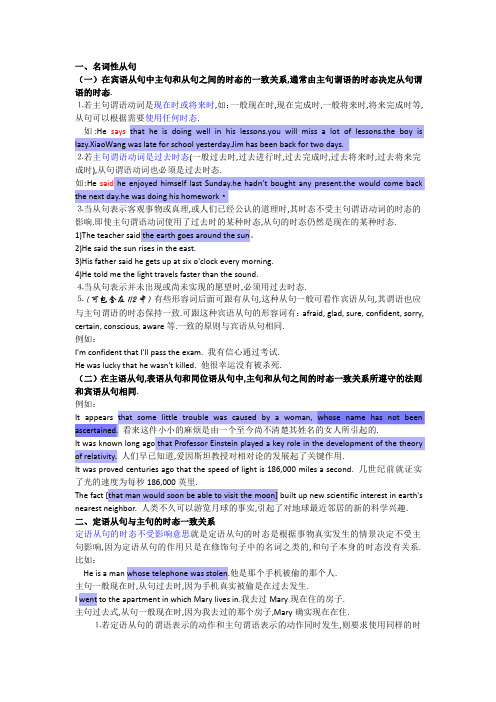
一、名词性从句(一)在宾语从句中主句和从句之间的时态的一致关系,通常由主句谓语的时态决定从句谓语的时态.⒈若主句谓语动词是现在时或将来时,如:一般现在时,现在完成时,一般将来时,将来完成时等,从句可以根据需要使用任何时态.如:He says that he is doing well in his lessons.you will miss a lot of lessons.the boy is lazy.XiaoWang was late for school yesterday.Jim has been back for two days.⒉若主句谓语动词是过去时态(一般过去时,过去进行时,过去完成时,过去将来时,过去将来完成时),从句谓语动词也必须是过去时态.如:He said he enjoyed himself last Sunday.he hadn’t bought any present.the would come back the next day.he was doing his homework·⒊当从句表示客观事物或真理,或人们已经公认的道理时,其时态不受主句谓语动词的时态的影响.即使主句谓语动词使用了过去时的某种时态,从句的时态仍然是现在的某种时态.1)The teacher said the earth goes around the sun。
2)He said the sun rises in the east.3)His father said he gets up at six o'clock every morning.4)He told me the light travels faster than the sound.⒋当从句表示并未出现或尚未实现的愿望时,必须用过去时态.⒌(可包含在1/2中)有些形容词后面可跟有从句,这种从句一般可看作宾语从句,其谓语也应与主句谓语的时态保持一致.可跟这种宾语从句的形容词有:afraid,glad,sure,confident,sorry, certain,conscious,aware等.一致的原则与宾语从句相同.例如:I'm confident that I'll pass the exam.我有信心通过考试.He was lucky that he wasn't killed.他很幸运没有被杀死.(二)在主语从句,表语从句和同位语从句中,主句和从句之间的时态一致关系所遵守的法则和宾语从句相同.例如:It appears that some little trouble was caused by a woman,whose name has not been ascertained.看来这件小小的麻烦是由一个至今尚不清楚其姓名的女人所引起的.It was known long ago that Professor Einstein played a key role in the development of the theory of relativity.人们早已知道,爱因斯坦教授对相对论的发展起了关键作用.It was proved centuries ago that the speed of light is186,000miles a second.几世纪前就证实了光的速度为每秒186,000英里.The fact[that man would soon be able to visit the moon]built up new scientific interest in earth's nearest neighbor.人类不久可以游览月球的事实,引起了对地球最近邻居的新的科学兴趣.二、定语从句与主句的时态一致关系定语从句的时态不受影响意思就是定语从句的时态是根据事物真实发生的情景决定不受主句影响,因为定语从句的作用只是在修饰句子中的名词之类的,和句子本身的时态没有关系.比如:He is a man whose telephone was stolen.他是那个手机被偷的那个人.主句一般现在时,从句过去时,因为手机真实被偷是在过去发生.I went to the apartment in which Mary lives in.我去过Mary现在住的房子.主句过去式,从句一般现在时,因为我去过的那个房子,Mary确实现在在住.⒈若定语从句的谓语表示的动作和主句谓语表示的动作同时发生,则要求使用同样的时态.The original manuscript of"The Theory of Relativity"was written by Einstein whowas employee in a patent office.“相对论”的原稿是由当时在一家专利办公室工作的爱因斯坦写的.⒉主句与定语从句的谓语表示的动作如果不是同时发生,时态则不要求一致.例如:Have you seen the new golf clubs that Mr.Stevens gave Bill?你看过史蒂文斯先生给比尔的那些新高尔夫球棒了吗?I painted several pictures that are now on show in the museums.我画了几张画,现在正在博物馆里展出.三、状语从句与主句的时态状语从句中的时态对应类型。
英语三大从句语法讲解

英语三大从句在英语中,主要有三大从句,即名词性从句包括主语从句,宾语从句,表语从句,同位语从句、形容词性从句即定语从句、副词性从句即状语从句,包括时间、条件、结果、目的、原因、让步、地点、方式等;定语从句一、关系代词引导的定语从句关系代词代替前面的先行词,并且在定语从句中充当句子成分,可以作主语、宾语、定语等;常见的关系代词有:who, that, which;它们的主格、宾格和所有格如下表所示:一关系代词who, whom和 whose的用法who代替人,是主格,在定语从句中作主语;An architect is a person who designs buildings. 建筑师是设计房屋的人;whom代替人,是宾格,在定语从句作宾语,在非正式英语常可省略;Do you know the gentleman whom we met in the school library yesterday 昨天我们在学校图书馆里遇到的那位先生你认识吗whose一般代替人,有时亦可代替物,是所有格,在定语从句作定语;The girl student whose father is a senior engineer used to study abroad. 其父是一位高级工程师的那个女学生过去在国外留学;Do you know the name of the hotel whose window we can see here 我们这儿能看到窗户的那个宾馆叫什么名字,你知道吗关系代词whose指代先行词hotel,正式用法应该用of which;whose window=the window of which,意思是:the window of the hotel;二关系代词which的用法which代替物,在定语从句作主语或宾语,作宾语时还可省略;I do not like stories which have unhappy endings.我不喜欢有不幸结局的小说;which可以换成that三关系代词that的用法that既可指人又可指物,在当代英语中大多指物,在定语从句作主语或宾语,作宾语时还可省略;: Is she the girl that sells newspapers她是卖报纸的那个女孩吗that可以换成whoWhere is the ice-cream that was in the fridge放在冰箱的冰激凌哪儿去了that可以换成whichIs this the book that you want to buy这是你要买的那本书吗 that可以换成which,在定语从句作宾语,还可以省略二、关系副词引导的定语从句常用的关系副词只有三个:when, where, why,在定语从句中充当时间、地点和原因状语;一关系副词when的用法关系副词when代替的先行词表示的是时间,when在定语从句作时间状语;In Beijing July and August are the months when it rains very often.北京的七月和八月是常下雨的月份;when先行词是months二关系副词where的用法关系副词where代替的先行词表示的是地点,where在定语从句作地点状语;During the Spring Festival I went back to the town where I was brought up.春节期间,我回到了生我养我的家乡;where的先行词是town三关系副词why的用法关系副词why代替的先行词表示的是原因,why在定语从句作原因状语;The reason why I am phoning you is to ask you whether you have got my email.我打电话给你的原因是想问问你是否收到了我的电子邮件;why先行词是reason, 当代英语里why可以用that替代,这时关系代词that就变成了表示原因的关系副词,还可以将why省略三、特殊关系代词as引导的定语从句一在固定搭配as…as, so…as, such…as, the same…as中,as引导定语从句You may take as many books as you want.你想要拿多少书就拿多少;第一个as是副词,修饰many的;第二个as才是关系代词,代替先行词books,在定语从句中作宾语二独立于主句之外,as引导定语从句As we know/ As is known to us, the earth turns around the sun. 正如我们所知,地球围绕太阳旋转;As we know和 As is known to us均为定语从句,as分别作宾语和主语,替代后面的主句;Taiwan is, as you know, an inseparable part of China.你知道,台湾是中国不可分割的一部分;关系代词as指代整个主句,在定语从句中作宾语;四、关系代词who, which与that的区别一关系代词who与that的区别1. 当关系代词用作主语时,多用主格who;He who loses hope loses all.失去希望的人就失去一切;先行词为代词he, they, any, all, one等时,多用whoI met Alice, who told me that she was learning Chinese.我遇见艾丽斯,她告诉我她在学汉语;在非限制性定语从句中,用who2. 当关系代词用作介词后的宾语时,用宾格whom,不用that;The man to whom our headmaster talked just now is our English teacher.我们校长刚才与他谈话的那个人是我们的英语老师;介词与关系代词紧密相连时,只能用宾格whom,不可用主格who注意:介词与关系代词不是紧密相连时,或者说介词放在句子后面时,这时可以用主格who,也可用that,还可以省略关系代词;因此,上面的这句话还可以有如下四种说法:1 The man whom our headmaster talked to just now is our English teacher.2 The man who our headmaster talked to just now is our English teacher.3 The man that our headmaster talked to just now is our English teacher.4 The man our headmaster talked to just now is our English teacher.3. 当关系代词泛指人时,多用that;He is a man that is never afraid of failure.他是个从不怕失败的人;that用来泛指人4. 当关系代词出现在who开头的疑问句时,应用that;例如:Who is the girl that is talking to Tom in English用英语同汤姆交谈的那个女孩是谁避免重复使用who,以免造成误解或语义含混不清二关系代词which与that的区别1. 当先行词为all, much, little以及不定代词anything, something, everything等时,关系代词多用that;All that glitters is not gold. 闪闪发光物,未必尽黄金;She told me everything that she knew. 她把她所知道的一切都告诉了我;2. 当先行词的前面有形容词最高级、序数词或限定词the only, the very, all, every, any, no 等时,关系代词一般都用that;This is the best novel that I have ever read. 这是我读过的最好的一部小说;He is the only person that has been invited to the ball. 他是惟一应邀参加舞会的人;3. 当关系代词出现在which开头的疑问句时,应用that;Which was the hotel that was recommended to the foreign guest 哪一个是推荐给外宾的宾馆这里使用that很明显是为了避免重复which4. 在非限制性定语从句中,关系代词一般只用which;Beijing, which is the capital of the People’s Republic of China, will host the 2008 Olympic Games. 北京是中华人民共和国的首都,将主办2008年奥运会;5. 介词后的关系代词用which,而不用that;She has collected 600 stamps, 60% of which are German stamps. 她收集了600张邮票,其中60%是德国邮票;五、定语从句的位置如前所述,定语从句一般总是直接置于所修饰的名词或代词之后;有时候,定语从句与先行词之间插入了其他的短语,这样它们被分隔了,这种情况下的定语从句被称作隔离定语从句;There was a girl upstairs who was shouting and crying, obviously mad.楼上有一个女孩,大喊大叫;很明显,她疯了;定语从句who was shouting and crying修饰the girl,被upstairs所隔开A new master will come tomorrow who will teach you German.明天要来一位新老师教你们德语了;定语从句置于句末以示强调名词性从句宾语从句一、引导词1由that 引导的陈述句性的宾语从句,在很多动词如say, think, wish , hope, see, believe, agree, expect, hear , feel等动词后;连词that只起连接作用,在从句中不做句子的成分,也无词汇意义,在口语中常被省略;如:I told him that he was wrong.在think, believe, suppose, expect等动词引起的宾语从句中,有时谓语尽管是否定意义,却不用否定形式,而将think 等动词变为否定形式;见语法:否定转移如:I don’t think you are right. 我认为你做的不对在许多带有复合宾语的句子中,that引导的宾语从句经常移到句子的后面,而用it做形式宾语;We think it wrong that he told a lie to everyone 我认为他向每一个人撒谎是错误的2 由连词if、 whether 引导的表示“是否…”的宾语从句;Whether, if 在从句中不做句子的成分,一般情况下,whether和if 可以替换;I don’t know if/whether he will come tomorrow.在介词后面的宾语从句中不用if引导Everything depends on whether we have enough money.宾语从句中有or not时不用if引导.I don’t know whether the movie star will come or not.和不定式连用作宾语时不用if引导Whether to go there or not hasn’t been decided.3由wh-引导的宾语从句;连接代词who, whom, whose, what, which和连接副词when, where, why, how 等连接的宾语从句,它们在句中即有连接从句的作用,又在句中充当句子的成分;Do you know which film they are talking about which做定语I don’t know where he lives. where 做地点状语二、宾语从句的语序,宾语从句的语序必须是陈述语序,既连接词+主语+谓语+其他成分 I believe that they will come soon.特例:有下列常见的问句,作为从句出现,是“不改变语句顺序”的;1. What's the matter2. What's wrong3. What's up4. What's the problem5. What's your trouble三、宾语从句的时态;宾语从句的时态受主句的限制,即:主句是一般现在时态,从句根据实际情况而定;主句是一般过去时态,从句用相应的过去的时态;如果从句的动作发生在主句之前,则从句要用过去完成时态;1 She says that she is a student.→ She said that she was a student.2She says that she will fly to Japan in a week. → She said that she would fly to Japan in a week.3She says that she has finished her homework alre ady. → She said that she had finished her homework already.1如果宾语从句说的是客观真理、自然现象或事实时,这时宾语从句要用一般现在时态;The teacher said that the earth goes round the sun.2Could you tell me…是用来征询对方的意见,语气委婉,并不表示过去;Could you tell me when we will visit the History Museum注意事项:3由陈述句变成宾语从句时,要注意人称的变化;She said: “I have been to England before.” → She said that she had been to England before. She asked me: “Do you like maths” → She asked me if I liked maths.4宾语从句与简单句的交换;由连接代词和连接副词引导的宾语从句,如果宾语从句的主语和主句的主语是同一个人时,可以用“疑问词+不定式”做宾语的简单句结构;I don’t know what I should do next. → I don’t know what to do next.DO SOME EXERCISES:you see AA. what he’s readingB. what is he readingC. what does he readD. he reads what2. Does Jack come from Japan Do you know合并成一个句子Do you know ___that__Jack __come___from Japandid your son say in the letter_He told me that he_D__ the Disney the next day.A. will visitB. has visitedC. is going to visitD. would visit4. He didn’t know___A____A. what’s the matterB. what the matter isC. what was the matterD. what the matter was5. Somebody called you just now, but I didn’t know__D__A. who were theyB. who they wereC. who was itD. who it was6. I want to know___D__A. what is his nameB. what’s his nameC. that his name isD. what his name is7. ---Could you tell me __C__she is looking for---Her cousin, Susan.A. thatB. whose C .who D. which8. ---What are you searching the Internet for---I’m trying to find out____.A. What is the difference between SARS and BIRDFLUB. How many persons have died in IraqC. How to protect our environmentD. Why is our Chinese team be able to beat Korea同位语从句一一般来说,在主从复合句中,用作同位语的从句叫同位语从句;它通常跟在某些名词之后,用以说明或解释该名词表示的具体内容;可以跟同位语从句的名词通常有:advice, decision, fact, hope, idea, information, message, news, promise, proposal, reply, report, suggestion, word消息,problem, question, doubt, thought等;eg: They were delighted at the news that their team had won.当听到他们队获胜的消息时,他们欣喜若狂;有时同位语从句可以不紧跟在被说明的名词后面,而被别的词隔开; 如:The thought came to him that Tom might have returned the book.他突然想起汤姆可能已经还了书了;二引导词1. The news that Mr. Li will be our new English teacher is true.2. He hasn’t made the decision whether he will go there.3. The question who should do the work is being discussed at the meeting.4. I have no idea what the boy is doing in the next room now.5. We haven’t yet settled the question where we are going to spend our summer vacation this year.6. I have no idea how I can get to the railway station.7. I have no idea when he will be back.小结:① that引导同位语从句时无词义,也不充当任何成分,但通常不可以省略,如句1;② whether引导同位语从句时意为“是否”,通常不能用if来代替, 如句2;③ 连接代词who, what等可以引导同位语从句,如句3, 4;④ 连接副词where, how, when等可以引导同位语从句, 如句5,6,7;三 that 引导的同位语从句和定语从句① 意义不同:同位语从句用来进一步说明前面名词的内容;而定语从句用来修饰、限定前面的先行词;试比较:1. The news that our team has won the final match is encouraging.2. The news that you told us is really encouraging.② that的功能不同:that引导同位语从句时是一个纯连词,不充当任何成分;而引导定语从句时,不仅起连接作用,而且还指代先行词并在从句中充当主语、宾语等成分;试比较:1. Dad made a promise that he would buy me a CD player if I passed the English test.2. Dad made a promise that excited all his children.③ 可否省略:that在引导同位语从句时,通常不可省略;在引导定语从句时,若在从句中作宾语,通常可以省略,若作主语则不可以省略;DO SOME EXERCISES:I. 请用适当的词填空,使下列句子意思完整;1. They expressed the hope _that_ they would come over to China soon.2. The fact ___that____ he didn’t see Tom this morning is true.3. Word has come __where_____ some American guests will come to our college for a visitnext week.4. He can’t answer the question ___how____ he got the money from his home yesterday.5. Do you have any idea __what___ is actually going on in the classroom6. The problem _______ we should have the meeting in the hall now must be decided at once. II. 下列各句中均有一处错误,请改正;1. Our team has won the game, that made us very happy.2. I’ve come with a message from Mr Wang how he won’t be able to see you this afternoon.3. He must answer the question if he agrees with what she said or not.4. I’ve read the book where you gave me the day before yester day.5. One of the men heldthe opinion when what the book said was right.表语从句表语从句只能置于主句之后,而主句的动词只能是连系动词;名词性从句在be等系动词后作表语时被称为表语从句The problem is how we can get the things we need.问题是我们怎样能弄到我们需要的东西;how 在表语从句中充当方式状语The scissors are not what I need. 这把剪刀不是我所需要的;what 在表语从句中充当宾语What I told him was that I would find him a good play. 我告诉他的是我会给他找个好剧本;what 在主语从句中作直接宾语, that作为表语从句的引导词在该表语从句中不充当句子成分, 不能省略That is what I want to tell you.那就是我想要对你讲的;what在表语从句中充当直接宾语That is why she failed to pass the exam. 那就是她考试不及格的原因;why 在表语从句中充当原因状语“That is why...”是常用句型, 意为“这就是……的原因/因此……”, 其中why引导的名词性从句在句中作表语, 该句型通常用于针对前面已经说明过的原因进行总结下面是两个与“That is why...”形式相似的结构, 它们与“That is why...”结构之间的关系要能够辨析清楚:1“That is why...”与“That is the reason why...”同义, 只不过从语法结构上讲, “That is the reason why...”中why引导的是—个定语从句, 将其中的the reason去掉则与“That is why...”结构一样 That is the reason why I cannot agree.2“That is because...”句型中从属连词because引导的名词性从句在此作表语, 这也是个常用句型, 意为“这就是为什么……/因为……”;“That is because...”与“That is why...”之间的不同在于“That is because...”指原因或理由, “That is why...”则指由于各种原因所造成的后果He did not see the film last night. That is because he had to help his little sister with her homework.昨天晚上他没有去看电影, 那是因为他得帮助他的妹妹做作业;第一句话说明结果, 第二句话说明原因He had seen the film before. That is why he did not see it last night.他以前曾看过那部电影, 因此他昨天晚上没有去看;第一句话说明原因, 第二句话说明结果考题1The traditional view is ____ we sleep because our brain is “programmed” to make us do so. 2007上海A. whenB. whyC. whetherD. that考题2You are saying that everyone should be equal, and this is ____ I disagree. 2004A. whyB. whereC. whatD. how考题3— I drove to Zhuhai for the air show last week.— Is that ____ you had a few days off 1999A. whyB. whenC. whatD. where考题4____ made the school proud was ____ more than 90% of the students had been admitted to key universities. 2003上海春A. What; becauseB. What; thatC. That; whatD. That; because考题5—Are you still thinking about yesterday’s game—Oh, that’s ____. 2003北京春A. what makes me feel excitedB. whatever I feel excited aboutC. how I feel about itD. when I feel excited表语从句与宾语从句的关系宾语从句和表语从句都属于名词性从句;其作用跟名词在句中的作用相同;故充当宾语的句子叫宾语从句,充当表语的句子叫表语从句;宾语从句1对于宾语从句要掌握以下三点①语序: 从句的语序必须是陈述句语序, 即“主语 + 谓语”这种形式;②时态: 当主句是一般现在时或一般将来时的时候, 从句可以是任何时态, 而当主句是一般过去时的时候, 从句时态必须是过去时范围的时态, 即一般过去时, 过去进行时, 过去完成时, 过去将来时;③连接词: 当从句意思完整, 主句意思肯定时, 连接词用that, 且可以省去当从句意思完整, 主句意思不确定或含否定含意时, 常用if或whether是否当从句意思不完整时, 连接词则是代替不完整部分的特殊疑问词;表语从句在句子中起表语作用的从句叫做表语从句,位于主句系动词的后面;表语从句的引导词和主语从句的引导词相同;也是名词性从句的一种;What the police want to know is when you entered the room.警察想知道的是你什么时候进的房间;The trouble is that we are short of funds困难是我们缺乏资金;This is what we should do这是我们应当做的;That is why I want you to work there那就是我要你在那儿工作的原因;His first question was whether Mr. Smith had arrived yet他的第一个问题是史密斯先生到了没有; 从句中的疑问句用正常语序,即陈述语序;as if, as though, because也可用来引导表语从句;She seems as if she had done a great thing她看起来好像做了一件大事;It is because you eat too much那是因为你吃得太多了;状语从句一状语从句的种类1.时间状语从句2.地点状语从句;3.原因状语从句;4.条件状语从句;5.目的状语从句;6.让步状语从句;7比较状语从句;8.程度状语从句;9.方式状语从句;10.结果状语从句;二状语从句的时态一般情况下,时间和条件状语从句的谓语动词一般用“一般现在时”表示“一般将来时”,用“现在完成时”表示“将来完成时”;1时间状语从句1.由when, while, as引导的时间状语从句;when, while和as的区别:when引导的从句的谓语动词可以是延续性的动词,又可以是瞬时动词;并且when有时表示“就在那时”;While引导的从句的谓语动作必须是延续性的,并强调主句和从句的动作同时发生或者相对应;并且while有时还可以表示对比;While my wife was reading the newspaper, I was watching TV.As表示“一边……一边”,as引导的动作是延续性的动作,一般用于主句和从句动作同时发生;as也可以强调“一先一后;As we was going out, it began to snow.当我们出门时,开始下雪了;as强调句中两个动作紧接着先后发生,而不强调开始下雪的特定时间2.由before和after引导的时间状语从句;before引导的从句不再用否定式的谓语,并且当before引导的从句位于主句之后,有时译成“就,才”; 时态:当主句用将来时,从句总是用现在时;如果before引导的从句谓语用的是过去时,则主句动词多用过去完成时,这样以便体现动作发生的先后;After表示主句动作发生在从句动作之后;主句和从句的动作的时间关系正好与before引导的从句相反;3.由till或until引导的时间状语从句;till和until一般情况下两者可以互换,但是在强调句型中多用until;并且要注意的是:如果主句中的谓语动词是瞬时动词时,必须用否定形式;如果主句中的谓语动词是延续性动词时,用肯定或否定形式都可以,但表达的意思不同;4.由since引导的时间状语从句;since引导的从句的谓语动词可以是延续性的动词,又可以是瞬时动词;一般情况下,从句谓语动词用一般过去时,而主句的谓语动词用现在完成时;但在It is +时间+since从句的句型中,主句多用一般现在时;5.由as soon as, immediately, directly, instantly, the moment, the instant, the minute, 等引导的时间状语从句;这些连词都表示“一……就”;hardlyscarcely, rarely…when / before, no sooner…than相当于as soon as之意;主句用过去完成时,从句用一般过去时;当hardly, scarcely, rarely和no sooner位于句首时,主句应用倒装语序;6.由by the time引导的时间状语从句;时态的变化:在一般情况下,如果从句的谓语动词用一般过去时,主句的谓语动词用过去完成时;如果从句的谓语动词用一般现在时,主句的谓语动词用将来完成时;7.由each time, every time和whenever引导的时间状语从句;8.由as long as和so long as引导的时间状语从句;这两个连词表示“只要;和…一样长”;2地点状语从句地点状语从句一般由连接副词where, wherever等引导,已经形成了固定的句型,:句型1:Where+地点从句,there+主句;此句型通常译成“哪里……哪里就……”;主句在从句后面时,there可用可不用;如果主句在从句的前面时,一般都不用there;句型2:Anywhere/ wherever+地点从句,+主句;状语从句是句子的状语由一个从句充当,来修饰主句中的动词,形容词或副词等;状语从句都由从属连词引导,与主句连接,放在句末时,一般不在前面加逗号;3原因状语从句: because, since, as和for都表示原因;because语势最强,回答why提出的问题,用来说明人所不知的原因;当能够很明显的看出原因或人们已知原因,就用as或since;由because引导的从句如果放在句末,且前面有逗号,则可以用for来代替;但如果不是说明直接原因,而是多种情况加以推断,就只能用for;4目的状语从句:表示目的状语的从句可以由in order that, so that,等词引导;5结果状语从句:结果状语从句常由so...that 或 such...that引导,首先要了解so和such后面分别跟什么词;such是形容词,修饰名词或名词词组,so是副词,只能修饰形容词或副词;so 还可与表示数量的形容词many, few, much, little连用,形成固定搭配;The box is so heavy that I can't carry it.6让步状语从句:是由though, although 引导的状语从句;。
初中英语主从复合句 (名词性从句 +定语从句 +宾语从句 +状语从句 )

初中英语专题:主从复合句名词性从句 +定语从句 +宾语从句 +状语从句1.—Could you tell____?—You can take No. 16 bus.A.how can I get to the Olympic Park B.how I can get to the Olympic ParkC.how did I get to the Olympic Park D.how I got to the Olympic Park全面解析:结合题干及选项可知此空是宾语从句,语序要用陈述句语序,排除A与C;由You can take No. 16 bus.可知此空要用一般现在时,故答案为B。
2.If you _______ hard, you _______ behind.A.won't study; will fall B.don't study; fallC.won't study; fall D.don't study; will fall全面解析:if 引导的条件状语从句,谓语动词要用一般现在时,主句要用一般将来时,故答案为D。
3.Mary will go to Sanya if she _________a five-day trip.A.have B.had C.will have D.has全面解析:A项是一般现在时复数,B项是一般过去时,C项是将来时,D项是一般现在时单数。
if 表示如果的含义的时候,应用主将从现的原则,即主句中用将来时,从句中用一般现在时的形式。
缺空在if 从句中作谓语动词,应用一般现在时。
she是第三人称单数,谓语动词要用第三人称单数形式,故选D。
4.I didn't know .A.where does Tom buy the gift.B.where Tom bought the gift.C.where did Tom buy the gift.D.where Tom will buy the gift.全面解析:分析句子结构可知,填空处是宾语从句,宾语从句用陈述句语序,选项AC是疑问句语序,排除AC;根据I didn't know 可知,主句是一般过去时,宾语从句用适合的过去时态,选项D是一般将来时,再排除D。
英语中的从句解析
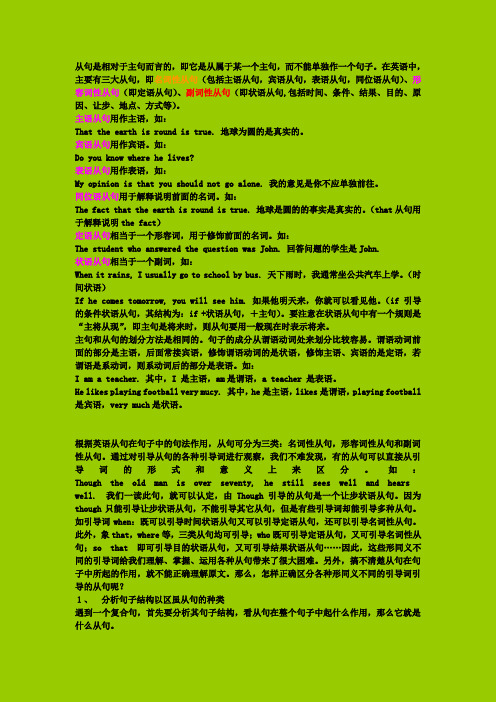
从句是相对于主句而言的,即它是从属于某一个主句,而不能单独作一个句子。
在英语中,主要有三大从句,即名词性从句(包括主语从句,宾语从句,表语从句,同位语从句)、形容词性从句(即定语从句)、副词性从句(即状语从句,包括时间、条件、结果、目的、原因、让步、地点、方式等)。
主语从句用作主语,如:That the earth is round is true. 地球为圆的是真实的。
宾语从句用作宾语。
如:Do you know where he lives?表语从句用作表语,如:My opinion is that you should not go alone. 我的意见是你不应单独前往。
同位语从句用于解释说明前面的名词。
如:The fact that the earth is round is true. 地球是圆的的事实是真实的。
(that从句用于解释说明the fact)定语从句相当于一个形容词,用于修饰前面的名词。
如:The student who answered the question was John. 回答问题的学生是John.状语从句相当于一个副词,如:When it rains, I usually go to school by bus. 天下雨时,我通常坐公共汽车上学。
(时间状语)If he comes tomorrow, you will see him. 如果他明天来,你就可以看见他。
(if 引导的条件状语从句,其结构为:if +状语从句,+主句)。
要注意在状语从句中有一个规则是“主将从现”,即主句是将来时,则从句要用一般现在时表示将来。
主句和从句的划分方法是相同的。
句子的成分从谓语动词处来划分比较容易。
谓语动词前面的部分是主语,后面常接宾语,修饰谓语动词的是状语,修饰主语、宾语的是定语,若谓语是系动词,则系动词后的部分是表语。
如:I am a teacher. 其中,I 是主语,am是谓语,a teacher 是表语。
初中英语专题:主从复合句 (名词性从句 +定语从句 +宾语从句 +状语从句 )

初中英语专题:主从复合句名词性从句 +定语从句 +宾语从句 +状语从句1.You should(应该)see a doctor,____you don't feel well.A.if B.and C.after D.before全面解析:if,连词,如果;and,连词,和;after,连词,在……后;before,连词,在……前;根据" You should(应该)see a doctor,……you don't feel well."可知这是一个条件状语从句,要表达如果你感觉不舒服的话应该去看医生,故选A。
2.We will go camping if it ____ tomorrow.A.rains B.will rain C.doesn't rain D.won't rain.全面解析:A一般现在是肯定形式,B将来时,C一般现在是否定形式,D一般将来时否定形式,If引导的条件状语从句,主句用一般将来时,从句要用一般现在时,主语是第三人称单数it,去宿营的前提是不下雨,所以用否定句,故选C。
3.—What are you going to do this Sunday?—If it is sunny, I ____ camping with my friends.A.will go B.went C.go全面解析:A一般将来时,B一般过去时,C动词原形,If引导的条件状语从句,主句的时态要用一般将来时,故选A。
4.—Did you tell Jack about the good news?—Oh, I was so busy these days that I just itA.forget B.forgetting C.forgot D.forgets全面解析:A动词原形,B动词的现在分词或者动名词,C动词的过去式,D动词的第三人称单数。
英语八大从句类型与用法总结

英语八大从句类型与用法总结
从句,是复句中具有分属地位的分句,它是一种绝大部分语言都有的语法结构。
在现代汉语的语法中,“从句”不作为专业术语被使用。
1 英语从句分类介绍从句体系包括:
从句体系(从句系统)图示
从句体系(从句系统)图示
第一,名词性从句(主语从句、表语从句、宾语从句及同位语从句)
第二,定语从句
第三,状语从句
分类
从句不能单独成句,但它也有主语部分和谓语部分,是一个特殊句子,就像一个句子一样。
所不同在于,从句须由一个关联词引导。
根据从句语法功能的不同可分为:主语从句、表语从句、宾语从句、同位语从句、定语从句和状语从句6 类。
前四类由于主语从句、表语从句、宾语从句及同位语从句在句子的功用相当于名词,所以通称名词性从句;
定语从句功能相当于形容词,称为形容词性从句;
而状语从句功能相当于副词,称为副词性从句。
状语从句还可以分为条件状语从句、原因状语从句、地点状语从句、目的状语从句、让步状语从句、比较状语从句、方式状语从句、结果状语从句和时间状语从句。
主语从句(Subject Clause)。
英语中五大从句
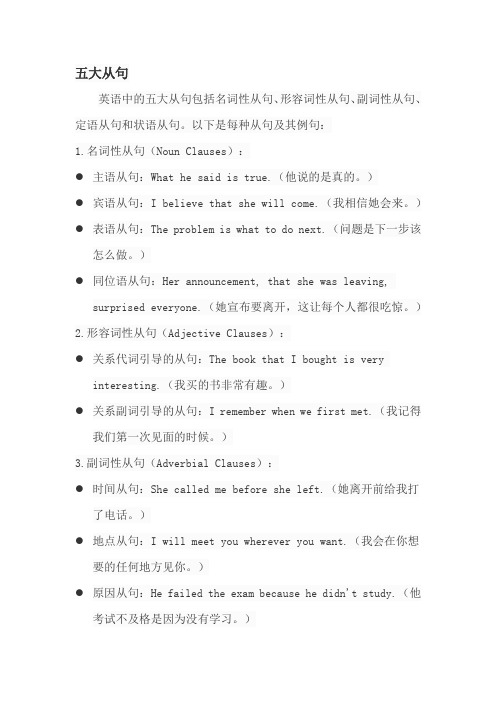
五大从句英语中的五大从句包括名词性从句、形容词性从句、副词性从句、定语从句和状语从句。
以下是每种从句及其例句:1.名词性从句(Noun Clauses):●主语从句:What he said is true.(他说的是真的。
)●宾语从句:I believe that she will come.(我相信她会来。
)●表语从句:The problem is what to do next.(问题是下一步该怎么做。
)●同位语从句:Her announcement, that she was leaving,surprised everyone.(她宣布要离开,这让每个人都很吃惊。
)2.形容词性从句(Adjective Clauses):●关系代词引导的从句:The book that I bought is veryinteresting.(我买的书非常有趣。
)●关系副词引导的从句:I remember when we first met.(我记得我们第一次见面的时候。
)3.副词性从句(Adverbial Clauses):●时间从句:She called me before she left.(她离开前给我打了电话。
)●地点从句:I will meet you wherever you want.(我会在你想要的任何地方见你。
)●原因从句:He failed the exam because he didn't study.(他考试不及格是因为没有学习。
)●条件从句:If it rains, we will stay indoors.(如果下雨,我们将呆在室内。
)●结果从句:He worked hard, so he succeeded.(他努力工作,所以成功了。
)4.定语从句(Adjective Clauses):●关系代词引导的从句:The man who is talking to my mother ismy uncle.(正在和我妈妈交谈的那个人是我叔叔。
初中英语专题:主从复合句 (名词性从句 +定语从句 +宾语从句 +状语从句 )

初中英语专题:主从复合句名词性从句 +定语从句 +宾语从句 +状语从句1.He is an honest boy. I have no reason to doubt ____ what he said is true or not.A.if B.whether C.that D.when全面解析:我没有理由怀疑他说的是真是假。
A:if是否;B:whether是否,要用or not连用;C:that无词义,只起到连接的作用,可以省略;D:when何时。
根据doubt,可知用连接词if或whether,且句末有or not,用whether,故选B。
2.—Who is the hero in your mind?—Huang Danian. He is a scientist ____has helped China make great progress in deep-sea exploration(勘探).A.who B.whom C.which D.where3.— Excuse me, could you tell me____?— Sorrv. I am new here.A.when the library opensB.how long does the old man live hereC.where is the nearest supermarketD.how do you get to the post office4.You don't know ____I want to see my grandparents again. It's been half a year since I last saw them.A.how soon B.how long C.how often D.how much5.I wonder____ there is a bank near the store.A.if B.what C.how D.where6.—Could you tell me ____?—At 10: 00 am this Tuesday.A.when you will arriveB.why you came hereC.who will you come with全面解析:when you will arrive 你什么时候会到;why you came here你为什么来这里;who will you comewith你会和谁一起来?由答语"At 10: 00 am this Tuesday."可知,这里询问的是时间,所以选择特殊疑问词when,表示"什么时候"。
初中英语主从复合句 (名词性从句 +定语从句 +宾语从句 +状语从句 )

初中英语专题:主从复合句名词性从句 +定语从句 +宾语从句 +状语从句1.While having dinner in China,the young often wait ____the elders take their seats.A.until B.after C.when全面解析:A直到,B在……之后,C当……时,根据the young often wait ____the elders take their seats和生活常识。
可知表示等待的动作一直持续到老年人就坐。
故选A。
2.I want to study how to grow fruits and vegetables in space ____ astronauts would never need to worry about food.A.even though B.so that C.as if全面解析:A即使,B这样,C好像,根据I want to study how to grow fruits and vegetables in space,可知结果是astronauts would never need to worry about food,所以用so that引导结果状语从句。
故选B。
3.—I don't know____.—At 3:00 p.m.yesterday.A.when the video meeting finishedB.when did the video meeting finishC.where the video meeting finishedD.where did the video meeting finish全面解析:宾语从句的语序是疑问词+陈述句的语序,故排除BD选项,根据回答,昨天下午3点,可知提问时间用疑问副词when,故选A。
4.—Could you please tell me____when I called you?—Nothing much.A.what you are doing B.what are you doingC.what you were doing D.what were you doing全面解析:A你在做什么?现在进行时,陈述语序,B你在做什么?现在进行时,疑问语序,C你在做什么,过去进行时,陈述语序,D你在做什么,过去进行时,疑问语序,根据句式分析可知,问句是含有宾语从句的一般疑问句,宾语从句应用陈述语序,再由句中的when I called you可知,本句应用相应的过去时态。
初中英语专题:主从复合句 (名词性从句 +定语从句 +宾语从句 +状语从句 )
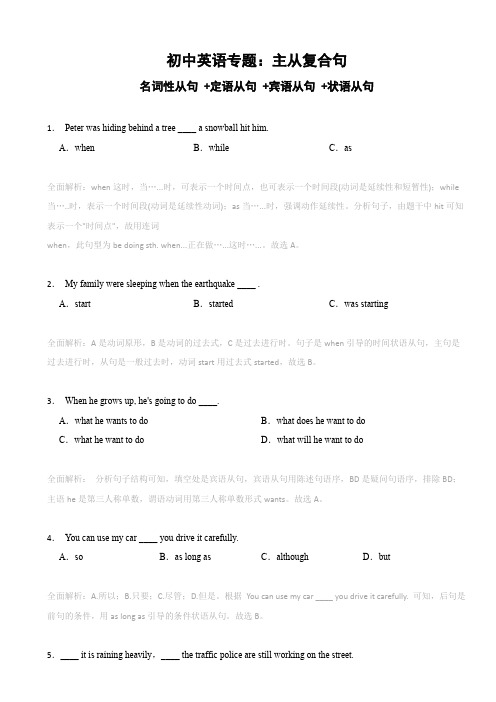
初中英语专题:主从复合句名词性从句 +定语从句 +宾语从句 +状语从句1.Peter was hiding behind a tree ____ a snowball hit him.A.when B.while C.as全面解析:when这时,当…...时,可表示一个时间点,也可表示一个时间段(动词是延续性和短暂性);while 当…..时,表示一个时间段(动词是延续性动词);as当…...时,强调动作延续性。
分析句子,由题干中hit可知表示一个"时间点",故用连词when,此句型为be doing sth. when...正在做…...这时…...。
故选A。
2.My family were sleeping when the earthquake ____ .A.start B.started C.was starting全面解析:A是动词原形,B是动词的过去式,C是过去进行时。
句子是when引导的时间状语从句,主句是过去进行时,从句是一般过去时,动词start用过去式started,故选B。
3.When he grows up, he's going to do ____.A.what he wants to do B.what does he want to doC.what he want to do D.what will he want to do全面解析:分析句子结构可知,填空处是宾语从句,宾语从句用陈述句语序,BD是疑问句语序,排除BD;主语he是第三人称单数,谓语动词用第三人称单数形式wants。
故选A。
4.You can use my car ____ you drive it carefully.A.so B.as long as C.although D.but全面解析:A.所以;B.只要;C.尽管;D.但是。
根据You can use my car ____ you drive it carefully. 可知,后句是前句的条件,用as long as引导的条件状语从句。
定语,状语,名词性从句讲解大全
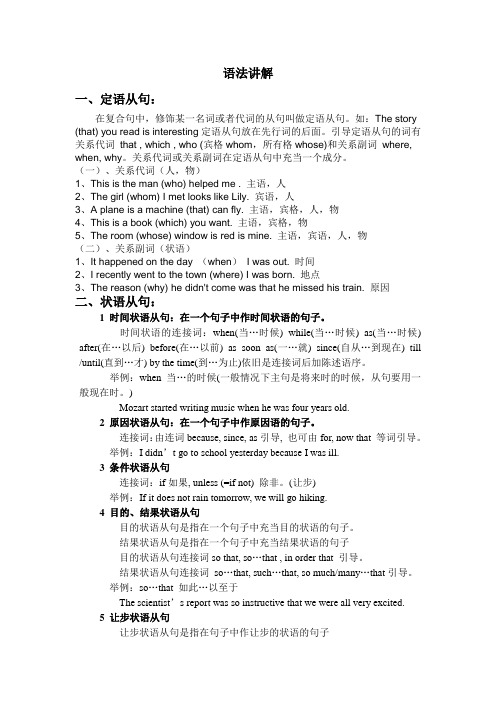
语法讲解一、定语从句:在复合句中,修饰某一名词或者代词的从句叫做定语从句。
如:The story (that) you read is interesting定语从句放在先行词的后面。
引导定语从句的词有关系代词that , which , who (宾格whom,所有格whose)和关系副词where, when, why。
关系代词或关系副词在定语从句中充当一个成分。
(一)、关系代词(人,物)1、This is the man (who) helped me . 主语,人2、The girl (whom) I met looks like Lily. 宾语,人3、A plane is a machine (that) can fly. 主语,宾格,人,物4、This is a book (which) you want. 主语,宾格,物5、The room (whose) window is red is mine. 主语,宾语,人,物(二)、关系副词(状语)1、It happened on the day (when)I was out. 时间2、I recently went to the town (where) I was born. 地点3、The reason (why) he didn't come was that he missed his train. 原因二、状语从句:1 时间状语从句:在一个句子中作时间状语的句子。
时间状语的连接词:when(当…时候) while(当…时候) as(当…时候) after(在…以后) before(在…以前) as soon as(一…就) since(自从…到现在) till /until(直到…才) by the time(到…为止)依旧是连接词后加陈述语序。
举例:when当…的时候(一般情况下主句是将来时的时候,从句要用一般现在时。
英语各种从句的区别
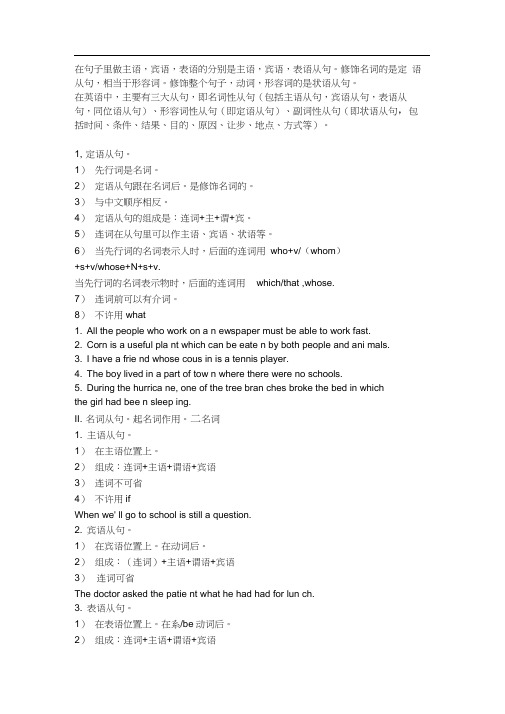
在句子里做主语,宾语,表语的分别是主语,宾语,表语从句。
修饰名词的是定语从句,相当于形容词。
修饰整个句子,动词,形容词的是状语从句。
在英语中,主要有三大从句,即名词性从句(包括主语从句,宾语从句,表语从句,同位语从句)、形容词性从句(即定语从句)、副词性从句(即状语从句,包括时间、条件、结果、目的、原因、让步、地点、方式等)。
1, 定语从句。
1)先行词是名词。
2)定语从句跟在名词后。
是修饰名词的。
3)与中文顺序相反。
4)定语从句的组成是:连词+主+谓+宾。
5)连词在从句里可以作主语、宾语、状语等。
6)当先行词的名词表示人时,后面的连词用who+v/(whom)+s+v/whose+N+s+v.当先行词的名词表示物时,后面的连词用which/that ,whose.7)连词前可以有介词。
8)不许用what1. All the people who work on a n ewspaper must be able to work fast.2. Corn is a useful pla nt which can be eate n by both people and ani mals.3. I have a frie nd whose cous in is a tennis player.4. The boy lived in a part of tow n where there were no schools.5. During the hurrica ne, one of the tree bran ches broke the bed in whichthe girl had bee n sleep ing.II. 名词从句。
起名词作用。
二名词1. 主语从句。
1)在主语位置上。
2)组成:连词+主语+谓语+宾语3)连词不可省4)不许用ifWhen we' ll go to school is still a question.2. 宾语从句。
三大从句
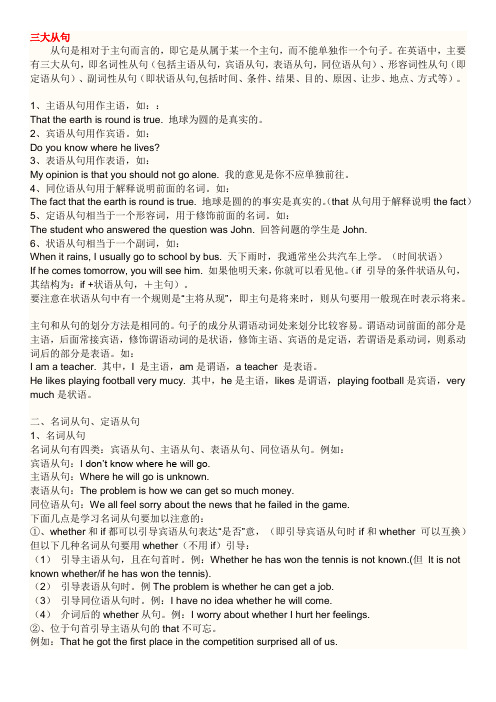
三大从句从句是相对于主句而言的,即它是从属于某一个主句,而不能单独作一个句子。
在英语中,主要有三大从句,即名词性从句(包括主语从句,宾语从句,表语从句,同位语从句)、形容词性从句(即定语从句)、副词性从句(即状语从句,包括时间、条件、结果、目的、原因、让步、地点、方式等)。
1、主语从句用作主语,如::That the earth is round is true. 地球为圆的是真实的。
2、宾语从句用作宾语。
如:Do you know where he lives?3、表语从句用作表语,如:My opinion is that you should not go alone. 我的意见是你不应单独前往。
4、同位语从句用于解释说明前面的名词。
如:The fact that the earth is round is true. 地球是圆的的事实是真实的。
(that从句用于解释说明the fact)5、定语从句相当于一个形容词,用于修饰前面的名词。
如:The student who answered the question was John. 回答问题的学生是John.6、状语从句相当于一个副词,如:When it rains, I usually go to school by bus. 天下雨时,我通常坐公共汽车上学。
(时间状语)If he comes tomorrow, you will see him. 如果他明天来,你就可以看见他。
(if 引导的条件状语从句,其结构为:if +状语从句,+主句)。
要注意在状语从句中有一个规则是“主将从现”,即主句是将来时,则从句要用一般现在时表示将来。
主句和从句的划分方法是相同的。
句子的成分从谓语动词处来划分比较容易。
谓语动词前面的部分是主语,后面常接宾语,修饰谓语动词的是状语,修饰主语、宾语的是定语,若谓语是系动词,则系动词后的部分是表语。
如:I am a teacher. 其中,I 是主语,am是谓语,a teacher 是表语。
英语八大从句类型与用法总结

英语八大从句类型与用法总结从句是句子中的一种结构,可以用来增强句子的表达能力。
英语中常见的八大从句类型包括:1. 名词性从句 (Noun Clauses)名词性从句用来作为名词的替代,可以作为主语、宾语、表语或同位语等。
常见的名词性从句有:主语从句(作主语),宾语从句(作宾语),表语从句(作表语),同位语从句(作同位语)。
2. 定语从句 (Adjective Clauses)定语从句用来对一些名词或代词进行修饰和限定,一般紧跟在被修饰的名词或代词之后。
常见的引导词有:that, which, who, whom, whose 等。
3. 状语从句 (Adverbial Clauses)状语从句用来修饰动词、形容词、副词等,表示时间、地点、原因、条件、结果等。
常见的引导词有:when, while, before, after, since, because, if, unless, so that等。
4. 并列从句 (Coordination Clauses)并列从句是由连词and, but, or等连接在一起的两个或多个独立的主句。
并列从句可以使用逗号或分号分隔。
5. 让步从句 (Concessive Clauses)让步从句用来表示与主句相对抗的情况,常用的引导词有:although, though, even though, while等。
6. 条件从句 (Conditional Clauses)条件从句用来表示其中一种条件,通过条件从句的实现与结果从句的实现之间的关系。
常见的引导词有:if, unless, as long as, provided that等。
7. 结果从句 (Result Clauses)结果从句用来表示主句发生的结果,常见的引导词有:so that, such that, so...that等。
8. 目的从句 (Purpose Clauses)目的从句用来表示主句的目的或意图,常见的引导词有:so that, in order that等。
英语八大从句类型总结

英语八大从句类型总结总结:从句是构成复合句的一部分,也是英语语法中非常重要的部分。
根据从句的用途和功能,可以将从句分为八大类型,分别是名词性从句、形容词性从句、副词性从句、定语从句、宾语从句、主语从句、表语从句和同位语从句。
每种从句都具有自己的特点和用法,下面将逐一介绍。
1. 名词性从句(Noun Clauses):名词性从句可作主语、宾语、表语和同位语等。
其引导词有that, whether, if, what, who, whom, which, whoever, whatever, whenever, wherever等。
名词性从句在句子中起到名词的作用,可代替一个名词短语或单个名词。
例句:- I don't know what he is doing.(主语从句)- Can you tell me where the library is?(宾语从句)- His question is whether we can finish the project on time.(表语从句)2. 形容词性从句(Adjective Clauses):形容词性从句用来修饰名词或代词,通常位于其所修饰的名词或代词之后。
其引导词有that, who, whom, which等。
例句:- The book that you lent me is very interesting.(修饰名词book)- I know a girl who can play the piano very well.(修饰名词girl)3. 副词性从句(Adverb Clauses):副词性从句用来修饰动词、形容词或副词,通常位于句子中的谓语动词之后。
根据从句的用途和功能,副词性从句可以分为条件状语从句、时间状语从句、地点状语从句、方式状语从句、目的状语从句、结果状语从句和比较状语从句等。
例句:- If it rains tomorrow, we won't go to the park.(条件状语从句)- He has lived in New York since he moved there ten years ago.(时间状语从句)- She looked for her keys everywhere she could think of.(地点状语从句)4. 定语从句(Relative Clauses):定语从句用来修饰名词或代词,通常位于其所修饰的名词或代词之后。
三大从句区别(定从,名词从,状从)
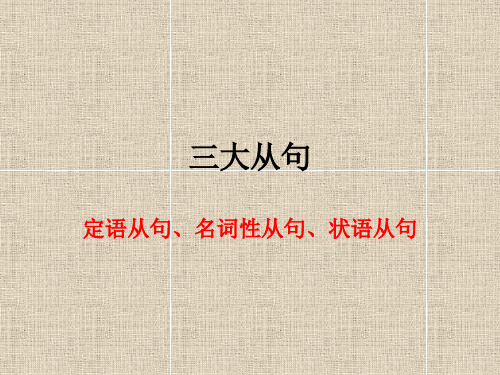
7. The question is who is responsible for what has happened. _________________. 表语从句/宾语从句 8. I don’t think that they will win the game. ___________________. 宾语从句 9. Whatever you do, you must do it well. _____________________. 让步状语从句 10. Whatever I have now will be yours in the future. _________________. 主语从句 11. The book can be of help to whoever wants to do 宾语从句 the job. ________________. 12. It remains doubtful whether this is an important discovery. ________________. 主语从句
三大从句
定语从句、名词性从句、状语从句
• 从句是相对于主句而言的,即它是从属于 某一个主句,而不能单独作一个句子。在 英语中,主要有三大从句,即名词性从句 (包括主语从句,宾语从句,表语从句, 同位语从句)、定语从句、状语从句
• (包括时间、条件、结果、目的、原因、 让步、地点、方式等)。
以he walked home all the way. 时间状语从句 _____________. 4. Many people, as you know, are learning foreign 定语从句 languages. _________________. 5. The news that our team has won the game was 同位语从句 true. _________________. 6. It was obvious that you’ve made a big mistake. 主语从句 ________. 7. He will talk to us about what he saw in the school. 宾语从句 _________________. 8. He looks as if he was going to cry. 表语从句 _________________.
初中英语专题:主从复合句 (名词性从句 +定语从句 +宾语从句 +状语从句 )

初中英语专题:主从复合句名词性从句 +定语从句 +宾语从句 +状语从句1.Peter spoke so ____th at I could not catch him.A.loudly B.carefully C.quickly全面解析:A:大声;B:小心地;C:很快。
根据I could not catch him.我没听清,可知是说得很快。
故选C。
2.No matter ____ busy he is, he won't give up his hobby.A.where B.how C.what D.who全面解析:A:哪里,B:怎样,C:什么,D:谁。
根据句子结构可知此空用来修饰busy,结合句意,how符合逻辑,故选B。
3.I didn't notice the cat____ it jumped on my legs. It is so cute.A.until B.but C.and D.when全面解析:它是如此可爱。
A:直到,B:但是,C:和,D:当。
根据短语"not until"直到……才,结合句意,符合逻辑,故选A。
4.____ you practice English more often, you will be better at it.A.Until B.If C.Before D.So全面解析:A:直到,B:如果,C:在……之前,D:所以。
更擅长英语的条件是多练习英语,所以此处应该引导条件状语从句,故选:B。
5.—Kate, do you know ____?—Yes. It's on Wednesday.A.when we'll have a picnicB.where we'll have a picnicC.who will go on a picnic with us全面解析:A我们什么时候去野餐,B我们去哪里野餐,C谁会和我们一起去野餐,根据回答on Wednesday,可知提问时间用疑问副词when,故选A。
深入分析中文中的五种主要从句类型

深入分析中文中的五种主要从句类型作为一种复杂而丰富的语言,中文中的从句在表达上起到了至关重要的作用。
从句是由一个主句和一个或多个从句组成的句子结构,用于提供更多的信息、解释或补充主句的内容。
在中文中,有五种主要的从句类型,分别是名词性从句、定语从句、状语从句、主语从句和宾语从句。
下面将对这五种从句类型进行深入分析。
一、名词性从句名词性从句在句子中充当名词的角色,可以作为主语、宾语、表语或同位语。
名词性从句通常由引导词“是”、“是否”、“怎么样”、“什么”、“谁”等引导。
例如:1. 主语从句:他说的是真的吗?(主语从句作为主语)你在想什么?(主语从句作为主语)2. 宾语从句:我不知道他是否会来。
(宾语从句作为宾语)他问我怎么走。
(宾语从句作为宾语)3. 表语从句:他的问题是什么?(表语从句作为表语)我的愿望是能够旅行世界各地。
(表语从句作为表语)4. 同位语从句:我听说他是个很有才华的画家。
(同位语从句作为同位语)我们都知道她是一位优秀的科学家。
(同位语从句作为同位语)二、定语从句定语从句用于修饰名词或代词,对其进行进一步的说明或限定。
定语从句通常由关系代词“的”、“之”、“所”、“连”的引导。
例如:1. 关系代词“的”引导的定语从句:我喜欢的书是《红楼梦》。
这是他的家人。
2. 关系代词“之”引导的定语从句:我们正在研究的是社会发展的趋势。
这是我所认识的那个人。
3. 关系代词“所”引导的定语从句:他所说的话我完全赞同。
这是他所写的一篇文章。
4. 关系代词“连”引导的定语从句:这是连我都没听说过的事情。
那是连他自己都不知道的秘密。
三、状语从句状语从句用于修饰动词、形容词、副词或整个句子,表达时间、原因、条件、目的、方式等相关信息。
状语从句可以由不同的从属连词引导,如“因为”、“如果”、“当”、“虽然”等。
例如:1. 时间状语从句:当他到达时,我们已经离开了。
昨天晚上,我看到了一颗流星。
2. 原因状语从句:因为下雨,所以比赛取消了。
初中英语专题:主从复合句 (名词性从句 +定语从句 +宾语从句 +状语从句 )

初中英语专题:主从复合句名词性从句 +定语从句 +宾语从句 +状语从句1.The mountains were____big____it took Yu Gong along time to walk the other side.A.so; that B.too; to C.not; until D.enough; to全面解析:so; that"如此……以至于……",用于连接两个句子,表示前一个句子所描述的情况导致了后一个句子所描述的结果。
too; to"太……而不能……"表示某物或某人因为过度或过量而不能达到某种状态或做某事。
not; until"直到……才……"用于描述某个动作或事件在另一个时间或条件发生之前一直没有发生,enough; to"足够……以至于……"表示某物或某人具有足够的某种性质或能力,以至于可以做某事。
根据句意可知,此处选择so ... that最符合题意,"so big"描述了山的大小,而"that it took Yu Gong a long time to walk to the other side"则是一个结果状语从句,说明了由于山的大小,愚公需要花费很长时间才能走到山的另一边,故答案为A。
2.Do you know____?A.what's the population of LuzhouB.how's the population of LuzhouC.what the population of Luzhou isD.how the population of Luzhou is全面解析:3.You must clean your room ____ your mother comes back.A.after B.but C.before D.and全面解析:after在……之后;but但是;before在……之前;and和。
- 1、下载文档前请自行甄别文档内容的完整性,平台不提供额外的编辑、内容补充、找答案等附加服务。
- 2、"仅部分预览"的文档,不可在线预览部分如存在完整性等问题,可反馈申请退款(可完整预览的文档不适用该条件!)。
- 3、如文档侵犯您的权益,请联系客服反馈,我们会尽快为您处理(人工客服工作时间:9:00-18:30)。
宾语从句宾语从句的概念:在复合句中,用来充当宾语的句子叫作宾语从句。
在谓语动词、介词、动词不定式等后面都可以接宾语从句,要想真正掌握宾语从句的用法,必须把握三个关键点:引导词、语序、时态。
考生在做此类试题时,首先从语序着手,宾语从句的语序应该为陈述句语序;再从时态考虑,一般情况下,宾语从句的时态要和主句的时态保持一致,但是,如果有明显的时间状语,要以时间状语来判断时态;最后,再根据答语来判断疑问词,问内容用what、问时间用when/what time、问地点用where、问原因用why、问方式用how 等例:—Could you tell me _____?—Last week.A. how he returned to BeijingB. when he left for BeijingC. when did he leave for Beijing【方法点拨】第①步:宾语从句的语序应该为陈述句语序,观察选项,可直接排除C项;第②步:根据答句中的时间状语“Last week”可知时态为一般过去时,且引导词为询问时间的when,故选B。
定语从句定语从句的概念:在复合句中作定语,修饰主句中某一名词或代词的从句,叫作定语从句。
被定语从句所修饰的词叫先行词,通常位于定语从句之前。
定语从句的关系词:引导定语从句的关系词包括关系代词that, which, who, whom, whose和关系副词when, where, why。
关系代词或关系副词位于先行词和定语从句之间,它既起连接作用,又充当从句中的一个成分。
考生在解答该类试题的时候,首先分析语境,可以把先行词还原到从句中,确定先行词在句子中所作的成分;其次在选择关系词时,要确定先行词是指人还是指物。
指人就从that、who、whose和whom 中选择;如果指物,就从that和which中选择。
如果先行词表地点,且在句中作状语则用where。
例:I still remember the college ____ I visited in London many years ago.A. whatB. whoC. that【方法点拨】第①步:分析语境“我仍然记得许多年前在伦敦参观的大学。
”,确定先行词为the college大学。
第②步:分析句子成分可知,先行词在句中作visited的宾语,指物,所以应该用that,故选C。
注意:通常在五种情况下关系代词只能用that而不用which:(1)先行词为all, much, something, everything, nothing, little, none, the one等不定代词时。
(2)先行词被形容词最高级修饰时。
(3)当先行词被the only, the very等词修饰时。
(4)先行词中既有人又有物时。
(5)当先行词前面有who, which等疑问代词时。
状语从句状语从句的概念:在复合句中充当状语的从句叫作状语从句。
状语从句可以用来表示时间、地点、原因、结果、目的、条件、比较、方式、让步等概念。
对状语从句的考查都会与从属连词相结合,主要在状语从句中考查从属连词的辨析及应用。
对if引导的条件状语从句和when引导的时间状语从句一般都会和时态相结合,即主要考查“主将从现”原则,而且为时态考查的重点。
练习题:1—Do you know _____ the meeting?—Tomorrow morning.A. when they hadB. when they are going to haveC. when did they have【解析】考查宾语从句的时态和语序。
句意为“你知道_____会议?”“明天早上。
”本题考查的是when引导的宾语从句, 因为宾语从句要用陈述语序,排除C,且根据Tomorrow morning可知为一般将来时态,因此排除A。
故选B。
2. If you _____ the laws, you’ll be punished by our country.A. brokeB. breakC. will break【解析】考查if引导的条件状语从句。
句意:如果你_____法律,你将受到国家的惩罚。
break laws 违反法律,if引导的条件状语从句遵循“主将从现”的原则,即主句用一般将来时,从句用一般现在时。
故选B。
3. —Have you decided _____ to the beach?—Not yet. It depends on the weather.A. whom to goB. where to goC. when to go【解析】考查宾语从句的用法。
句意为“你决定_____海滩了吗?”“还没有呢,根据天气情况而定。
”根据句意视天气情况而定可知不知道什么时候去,故选C。
4.—Could you tell me ________the Dragon Boat Festival in China?—Sure. People usually watch the dragon boat races and eat zongzi.(15长沙中考)A. when do people celebrateB. why people celebrateC. how people celebrate【解析】宾语从句的考点基本为语序,时态和疑问词。
根据语序可马上把A排除。
再看句意。
第二个说话者说人们经常看龙舟比赛和吃粽子,说明问的是如何过端午。
因此要选择how开头的疑问句,故选C。
5. I think Zhangjiajie is one of the best places ______ I have visited.A. thatB. whatC. where【解析】考查定语从句的关系词。
句意:我认为张家界是我参观过的最好的地方之一。
当先行词被形容词最高级修饰时,关系词只能用that。
故选A。
6. This is the primary school ____ I studied three years ago.A. whereB. whenC. that【解析】考查定语从句的关系词。
句意:这是我三年前上的那所小学。
根据先行词the primary school可知是地点,且在句中作状语,故使用关系副词where。
故选A。
7. _____I got up early this morning, I didn’t catch the train.A. WhenB. AlthoughC. Because【解析】考查让步状语从句。
句意:_____我今天早晨起得早,但是我也没有赶上火车。
When当……时;Although虽然,尽管;Because因为。
结合语境可知上下文之间为让步关系,故选B。
8. The policeman asked him _____ when the accident happened.A. what he was doingB. he was doing whatC. what was he doing【解析】考查宾语从句的语序。
句意:警察问他当事故发生的时候_____ 。
ask sb. sth.,故此处使用宾语从句,需用陈述句语序。
故选A。
9. —Jack, could you tell me ____ for travelling this summer? —We plan to go and see the beautiful sea in Hainan.A. where your family will goB. how will your family goC. how your family will go【解析】考查宾语从句的引导词和语序。
句意为“杰克,你能告诉我今年暑假旅行____吗?”“我们计划去海南看美丽的大海。
”根据宾语从句必须用陈述句语序的原则,可排除选项B;同时,由答语中回答的是地点,可知用where提问。
故选A。
10.____he had failed many times, he didn’t give up and succeeded in the end.(15长沙中考)A. UnlessB. AlthoughC. If【解析】观察选项发现时几个逻辑词,要做的就是判断两句之间的前后关系。
前面说他失败了很多次,后面说他没放弃。
是存在一个相反的让步关系。
11.Theshop_____sells flowers is at the end of the street.(14长沙中考)A. whoB. whereC. which12.I won’t go to tomorrow’s party______ I am invited.(14长沙中考)A. ifB. unlessC. When13.—Excuse me, could you please tell me ______?—Sure. It’s about ten minutes’ walk.(14长沙中考)A. how long it takes to go to the zooB. how far it is from here to the zooC. how far is it from here to the zoo。
